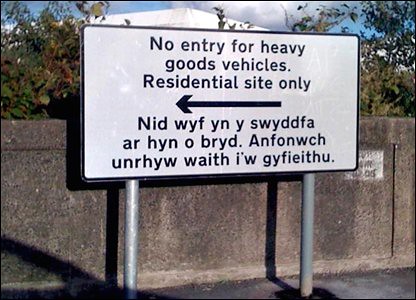At least the road sign didn’t say Nid wyf yn y swyddfa ar hyn o bryd. Anfonwch unrhyw waith i’w gyfieithu.

At least the road sign didn’t say Nid wyf yn y swyddfa ar hyn o bryd. Anfonwch unrhyw waith i’w gyfieithu.

Isn’t that one infamous and no,longer in existence!
A quick question on surprise/surprised - “synnu” in the past. Dw i’n synnu is I am surprised, but I’ve surfed for on i’n synnu and it’s spelling variations and can only find one from a book by Eurig wyn in 2014 “Ar y pryd roeddwn i’n synnu”
I see “on i wedi synnu” quite a bit, which makes sense to me, but inconsistent with dw i’n synnu. “Ro’n i wedi synnu at ei ymddygiad” (Manon Steffan Ros)
I am having a language cross-over issue here for I was surprised - i.e. to wedi synnu or not and why or why not?.
I think you’d hear it as ‘wedi synnu’ in the past more often than not, on the same general principle as ‘wedi blino’ - but you’ll be understood either way - it’s more about personal preference than anything… 
Diolch - technically it seems right to wedi in the past so happy with that and knowing that if I don’t (and there’s a high probability of that happening in the real world) then it won’t matter either is a bonus - a win win…
(I was thinking about wedi blino, but I have never heard or seen dw i wedi synnu, like dw’i wedi blino.)
By the way, it’s good to see you back 
diolch - good to be back.
One thing I should say - a USP if you like for SSIW. This must be the best place to go to ask and get great answers for these little niggling questions - i.e. what do people really say.
Hello!
So another (hopefully quick) question.
siarad vs dweud
I’m still trying to understand the nuance between them. So far, I’ve got siarad as ‘to talk, to speak’, and then dweud as ‘to say’, but when I echo the speakers, I find that sometimes I’ll use one where they’ve used another. Is there a further difference between the two that I haven’t yet picked up on? I suspect I’ll probably be understood regardless, I’m just trying to figure it out. 
I think this is very common. It’s that two concepts very close to each other get mixed as we’re learning. Clywed and gwrando, gweld and gwylio are others I can think of.
They are different:
Siarad: to speak
Dweud: to say
Dweud wrth - to tell / say to
Ok, so I am understanding correctly! Diolch! I think it just needs more practice, then 
I’ve had another thought. Gofod = Outer Space, but can it also mean space as in the concept. My job title is given as :
Cynorthwy-ydd Cynllunio Gofod = Space Planning Assistant.
My thinking is that Cynorthwy-ydd Cynllunio Llefydd is better, or is that more placey? As a Welsh learner I really don’t want my e-mail signature to have a mistake, imagine the shame. I know they were professionally translated, but I’ll wager the translator had no idea what space planning is, no-one i speak to in real life seems to. It’s planning the spaces in shops, so can anyone help? Is gofod okay for this meaning. To be honest it’s a bit mad in English anyway, often people think I’m designing space rocket missions, if only!
Hmm… As an architect, I at least know what space planning is, but that doesn’t mean I have any idea what a better translation would be. I wonder if “area” - ardal - would be a good choice, though I’ve only seen that in relation to geographic areas (like communities). Or can you think of any other words for the sort of space you plan?
I would say lleoedd (spaces) might be better than llefydd (places), or you could maybe use man / mannau. Gofod does seem to me to be more “space as in beyond Earth’s atmosphere”, but I couldn’t say for certain that it is only that.
It’s the concept of space. Ardal to me seems grounded in geographical area as in area around. I have just found ‘lle gwag’ = empty space, or even gwagle, which seems on the right lines, we plan to fill empty space, but not too much, I think it gets the concept across better as it would be the ideal, on the other hand I’m not planning empty space.
I actually think Siaron is on the right track with lleoedd (rather than llefydd). Or how about gofodol which is apparently “spatial” or “dealing with space”?
My (unevidenced) feeling is that ‘gofod’ probably is the best translation here… 
I think that’s the core point here. Most people who work in local government will have seen ‘gofod’ used in this context, but others may well boggle faintly in the same way they would in English… 
On last one from me, (sorry for so many posts at once).
Magu for “bringing up” and other types of growing/getting. Is this ok as an alternative to tyfu lan? Could it be equivalent to “growing/raising” in a general sense?
Here is the context, from the BBC website:
Cafodd Kate ei geni yn Aberdâr a’i magu yng Nghaerdydd…
I would say that ‘tyfu lan’ is a translation of ‘to grow up’, whereas ‘magu’ is the more ‘correct’ word. People use both, but my Welsh teachers prefer the second.
I’m not sure but I don’t think you’d use ‘magu’ with ‘cael’ so you would say 'ges i fy magu yn … ’ but not with ‘tyfu lan/i fyny’ so, to me, much easier to go with ‘magu’. You could say 'wnes i dyfu i fyny … ’ of course but the ‘magu’ version is what more natural speakers would say so …